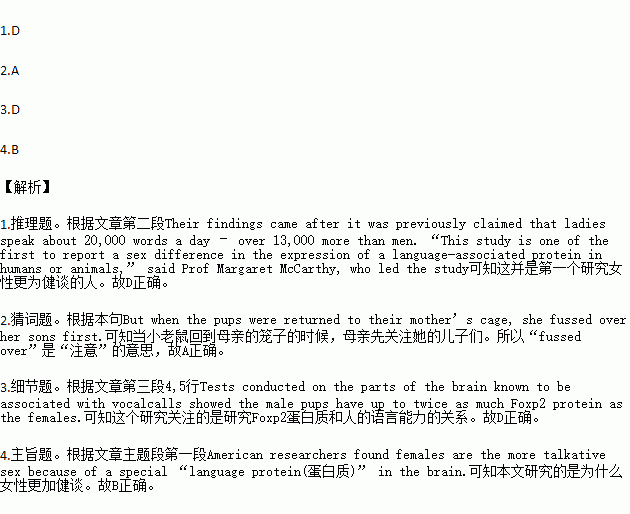题目内容
B
American researchers found females are the more talkative sex because of a special “language protein” in the brain.
The study, conducted by neuroscientists(神经学家) and psychologist from the University of Maryland, concluded that women talked more because they had more of the Foxp2 protein. The research, published in the Journal of Neuroscience, found that higher levels were found among humans that were women but in rats that were males. Their findings came after it was previously claimed that ladies speak about 20,000 words a day – over 13,000 more than men. “This study is one of the first to report a sex difference in the expression of a language-associated protein in humans or animals,” said Prof Margaret McCarthy, who led the study. In their study, the researchers attempted to determine what might make male rats more vocal than their female friends.
They separated four-day-old rats from their mothers and then counted the number of times they cried out in the “ultrasonic(超声波的) range”, the frequencies higher than humans can hear, over five minutes. While both sexes called out hundreds of cries, the males called out twice as often, they found. But when the pups were returned to their mother’s cage, she fussed over her sons first. Tests conducted on the parts of the brain known to be associated with vocal calls showed the male pups have up to twice as much Foxp2 protein as the females. The researchers then increased the production in the brains of female pups and reduced it in males. This led to the female rats crying out more often and their mothers showing more interest to them. In contrast, males became less “talkative”.
The researchers then tested samples from ten children, aged between three and five, which showed that females had up to 30 per cent more of the Foxp2 protein than males, in a brain area key to language in humans.
“Based on our observations, we assume higher levels of Foxp2 in girls and higher levels of Foxp2 in male rats is an indication that Foxp2 protein levels are associated with the more communicative sex,” said Prof McCarthy.
“Our results imply Foxp2 as a component (成分)of the neurobiological basis of sex differences in vocal communication in mammals.”
1.From the second paragraph, we can learn that ________.
A. women always speak more words than men
B. men and male rats have low levels of language protein
C. women and male rats have similar levels of Foxp2
D. McCarthy isn’t the first to find females more talkative
2.The underlined phrase “fussed over” in the third paragraph probably means______.
A. paid attention to B. related to
C. put pressure on D. counted on
3.The researchers carried out the experiments on rats in order to _______.
A. test which part of the brain is key to language in rats and humans
B. prove the levels of Foxp2 protein in humans and rats are different
C. determine the reason why female rats are more talkative than male rats
D. discover the association between Foxp2 protein and vocal communication
4.Which of the following can be the best title for the passage?
A. Tests on humans and rats
B. Why women are the talkative sex
C. Sex differences in Foxp2 protein
D. Foxp2 protein determines oral ability
 课时掌控随堂练习系列答案
课时掌控随堂练习系列答案 一课一练一本通系列答案
一课一练一本通系列答案 浙江之星学业水平测试系列答案
浙江之星学业水平测试系列答案
